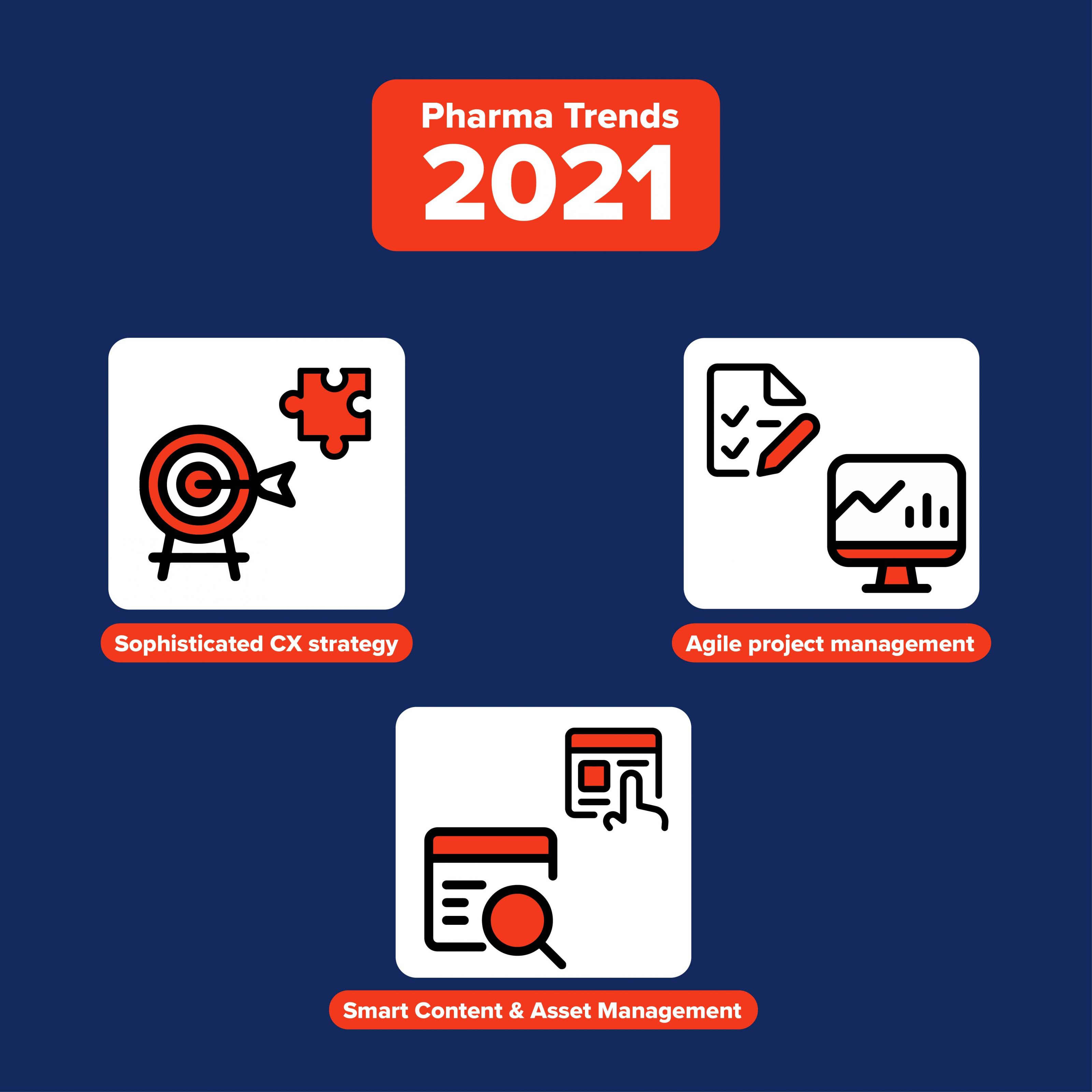Digital trends for the pharmaceutical industry 2021
Agility, smart asset management & sophisticated CX strategy - these trends will revitalise your business

Admittedly, technical innovations and digital trends have traditionally had a rather difficult time in the pharmaceutical industry. Legal requirements and strict regulations slow down digital change considerably - even if they make sense. But the lockdown and the pandemic have rapidly advanced digitalisation in the pharmaceutical industry over the past year.
Both on the patient side and among service providers, the acceptance of digital products and services has increased significantly. According to a study by an American market research institute, global sales of mHealth solutions alone increased by more than 10 billion dollars in 2020. The turnover from artificial intelligence in the healthcare sector was already 4.9 billion dollars in 2020.
Global sales of mHealth solutions are up more than $10 billion in 2020.
Our pharma experts Jens Reufsteck and Tobias Hollritt have accompanied several clients through the above developments. In this blog post, they reveal which digital trends will be important for drug manufacturers in 2021.

Trend #1: A sophisticated CX strategy focuses on the patient
2021 requires pharmaceutical companies to change their perspective: the patient - or, depending on the product, the doctor or pharmacist - is at the centre of all your digital activities.
For this, you need a sophisticated CXM strategy and comprehensive information about your customers and their needs. Why and how these two factors are connected is explained in detail in the Merkle CX Imperatives 2021. Here is the short version: A customer experience that inspires and captivates your customers and speaks to their hearts is based on a great deal of consolidated user data.
A customer experience that inspires, captivates and speaks from the heart to your customers is based on a great deal of consolidated user data.
This is where artificial intelligence comes into play: with its help, you can easily collect, manage and analyse large amounts of data automatically. This information can now be collected in a GDPR-compliant manner - which is particularly important for the extremely sensitive patient data in the pharmaceutical sector.
If you are wondering why a well thought-out digital CXM strategy is essential in 2021, here are the answers:
- Whether patient, doctor or pharmacist, all your target groups have one thing in common: they are used to beinginformed and entertained in real time. Streaming services, virtual voice assistants and ordering apps make this possible. No wonder that users now expect the same digital offer from pharmaceutical producers.
- Millenials have grown up and can now be found in all your target groups. This generation is characterised by the fact that they prefer to use digital channels and like to obtain information first-hand: According to a study by the University of Warwick, they use various digital clinical communication channels every day - for between 45 minutes and 9 hours a day.
- Customer concerns about privacy remain a major challenge. 55% of consumers do not want to trust organisations with their health data. This means for your company: Create transparency - and trust in your company - with an appropriate CXM strategy.
Trend #2: Agile project management keeps your company adaptable
If you want to live adaptability, you need more than digital tools and strategies. With the right way of working, your company can always react appropriately to new situations in the market. "Agility" is the magic word here.
Especially in uncertain times and with complex issues, agile organisations have a clear advantage. Agile working strengthens the innovative power of a company. Especially in the R&D departments of drug manufacturers, this is an important factor. Agile product development produces testable results quickly. This reduces the risk of expensive bad investments and developments.
So what does agility have to do with the digitalisation of the pharmaceutical industry? For one thing, the digital transformation brings new tools and technologies to the market every day. The more adaptable your company is, the faster it can take advantage of them and not run the risk of being left behind by the competition. On the other hand, agility is also associated with a culture of testing - that is, you check yourself which new techniques and channels convince your target group.
Examples from practice: Agile organisation
Product-based agile approaches are becoming increasingly important for market success. The so-called waterfall-oriented project approach is too rigid for new platform approaches. We therefore recommend that our clients develop products with clear release management and lifecycles. This allows the company to react quickly to new requirements and situations.
Trend #3: Intelligent content & asset management bring content at the right time
According to a study from 2019, 89 percent of all patients inform themselves about health topics. The pandemic and the lockdown last year may have pushed this number even higher. One thing is clear: pharmaceutical companies must offer their customers relevant content - at any time and anywhere.
The best way to do this is with intelligent content and asset management systems. They orchestrate and manage all content of the customer journey across the different channels of your company. The systems always play out exactly the content that your user needs at the relevant point in his or her journey.
This saves your company a lot of time and administrative effort. Your employees can concentrate fully on the design of new formats and content. In addition, you can easily evaluate the results with the data from the system - and decide which content you will continue to use. Your customers benefit from exciting content that really interests them. That sounds like a win-win situation.
Practical example: Intelligent Content & Asset Management
We support a drug manufacturer in migrating to an intelligent CMS. This way, we ensure that medical employees and patients receive relevant information about the brand and health topics.
We also use the artificial intelligence of the Salesforce system Social Studio. It reports unwanted events in the client's social media channels and automatically classifies user comments. This way, the company can always react correctly immediately.
Become a trendsetter in the pharmaceutical industry yourself
Would you like to optimise your CXM strategy, find out how agile your company really is or are you looking for the perfect content management system? We are happy to support you. Contact us here.
Authors of the article: Jens Reufsteck and Tobias Hollritt













